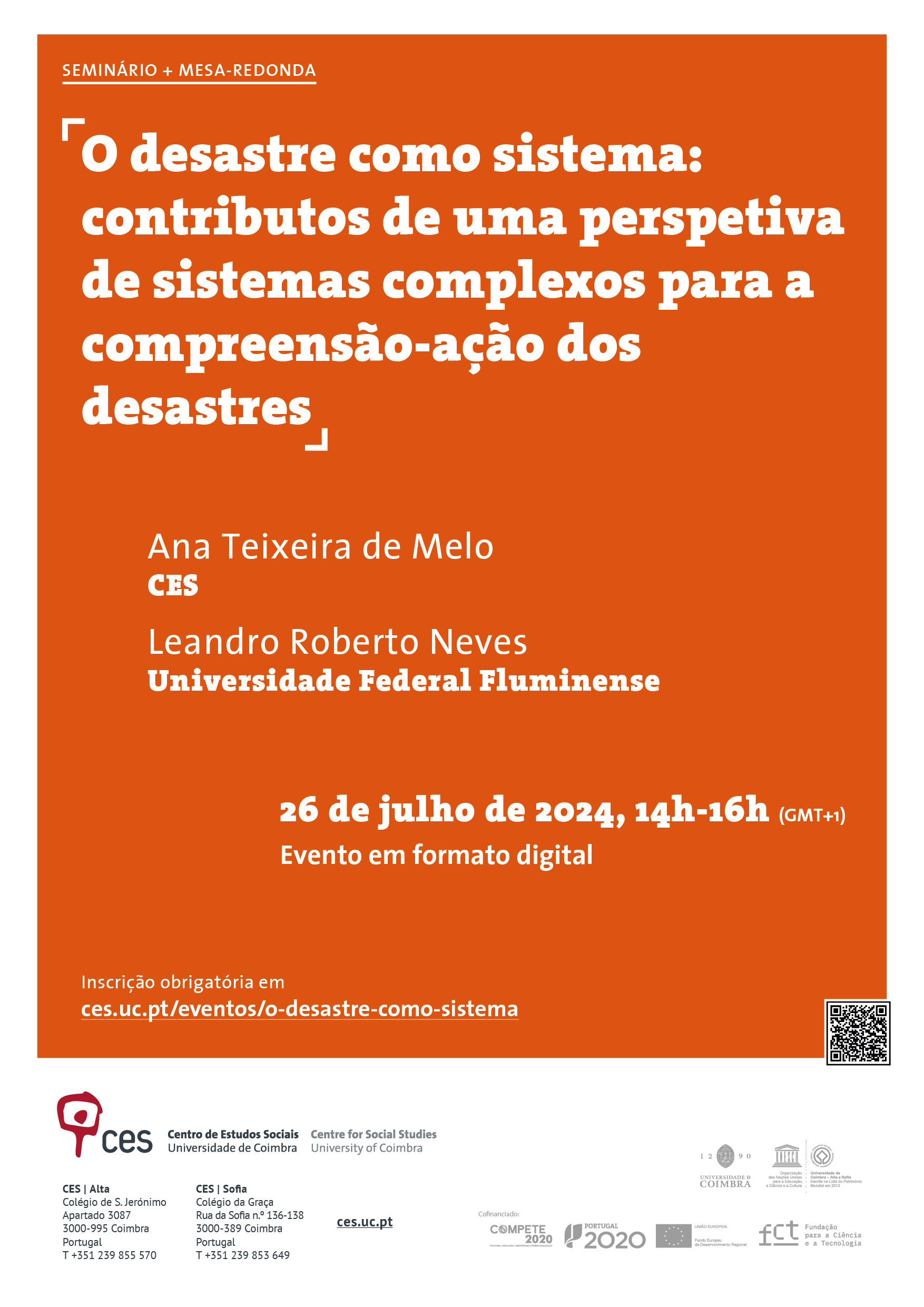Seminar + Roundtable
Disaster as a system: contributions from a complex systems perspective to disaster understanding-action
Ana Teixeira de Melo
Leandro Roberto Neves
July 26, 2024, 14h00-16h00 (GMT+1)
Online event | Compulsory Registration
According to the International Disaster Database (EM-DAT), between 1991 and 2010, around seven thousand and six hundred disasters were recorded worldwide, totalling around one and a half million deaths and more than four billion people affected. Scientific surveys show a significant increase in the frequency and intensity of extreme events since 1950, with the destruction of entire cities, loss of life, and material and immaterial damage in various spheres of society. Increasingly, disaster thematics have been under the media’s spotlight while permeating the daily lives of many populations. The debate on disasters is pressing as a contribution to thinking about new forms of prevention and intervention in disaster contexts, as well as new and more positive strategies for dealing with phenomena with severe consequences that are not only difficult to manage but also increasingly inevitable.
In the scientific field, a growing body of work seeks to debate disasters in terms of their characteristics, frequency, magnitudes, temporalities, and the agents that cause them. The procedural complexity of the phenomenon and its systemic intersections require efforts to bring together various areas of knowledge. On a practical level, cross-cutting and cross-sectoral actions are required, both at a macro level, linking environmental, economic, political and cultural issues, and at a micro level, considering local processes and the social relationships involved in the affected communities. This roundtable aims to stimulate a debate on the implications for theory, research, and practice of conceptualising disaster from a systems' perspective, a complex systems' perspective, and a process perspective. A brief initial framework will be provided on the dominant paradigms for understanding disasters, introducing a proposal for a basic systemic vocabulary to describe disaster situations and their multiple dimensions, presenting general guidelines for reading disasters from a complex systems perspective and launching questions for debate. The intention is to contribute to the establishment of new interdisciplinary collaborations and to the formation of sufficiently complex frameworks of thought to guide policies, interventions, and practises towards more effective actions in the context of disasters.
Programme
14:00-14:10 | Welcome - Ana Teixeira de Melo
14:10-14:25 | Framework (15 min): Leandro Roberto Neves
14:25-14:35 | Q&A
14:35-16:10 | Roundtable debate - Moderator: Ana Teixeira de Melo and Leandro Roberto Neves
16:10-16:30 | Integration and conclusion
Bio note
Leandro Roberto Neves has a degree in Psychology from the University of Taubaté, a Master’s degree in Management and Regional Development and a PhD in Social Psychology from the University of São Paulo (2013). He is currently a lecturer/researcher at the Fluminense Federal University. Roberto works on the Rural Education course and in non-governmental organisations linked to culture, the environment, and family farming. He develops research and actions involving the following themes and fields of knowledge: Social Psychology, Environmental Psychology, Psychology of Emergencies and Disasters, The Agrarian Question in Brazil, Brazilian Socio-Spatial Formation, and Rural Tourism. He favours research into: the city, public policies, territory, education, interdisciplinary projects and culture.


